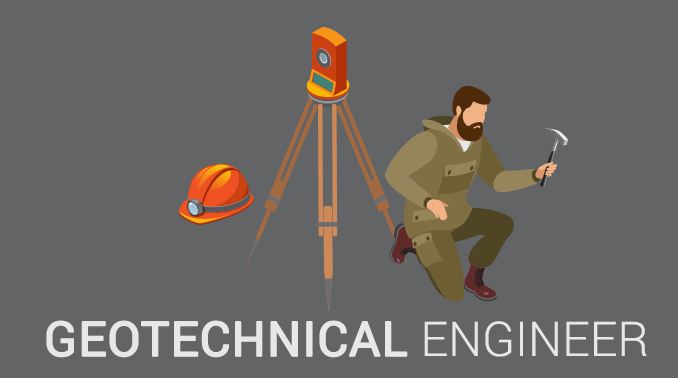Some Ideas on Geotheta You Need To Know
Some Ideas on Geotheta You Need To Know
Blog Article
Geotheta - Truths
Table of ContentsWhat Does Geotheta Do?The Ultimate Guide To GeothetaThe Best Guide To GeothetaGeotheta Fundamentals ExplainedIndicators on Geotheta You Should Know

They conduct site investigations, accumulate examples, perform laboratory tests, and evaluate information to review the viability of the ground for building projects - Geo Tech Engineering. Based upon their findings, geotechnical engineers give referrals for foundation style, incline stability, retaining frameworks, and mitigation of geotechnical threats. They collaborate with other experts, such as designers, structural designers, and building and construction groups, to make certain that geotechnical considerations are integrated right into the general project layout and execution
By evaluating the habits and residential or commercial properties of soil and rock, they can determine possible geotechnical hazards such as landslides, dirt settlement, or slope instability. Their experience aids avoid failures or crashes that could jeopardize lives and home. Right here are some in-depth obligations and duties of a geotechnical engineer: Website Examination: Geotechnical designers conduct website investigations to gather information on subsurface problems.
They analyze the information to recognize the buildings and actions of the soil and rock, including their toughness, permeability, compaction qualities, and groundwater conditions. Geotechnical Evaluation and Layout: Geotechnical designers evaluate the data collected during website investigations to analyze the security and suitability of the website for building and construction jobs. They perform geotechnical estimations and modeling to evaluate aspects such as bearing capacity, settlement, incline stability, lateral earth pressures, and groundwater flow.
The Basic Principles Of Geotheta
Structure Layout: Geotechnical designers play a vital role in designing structures that can securely sustain the intended framework. They examine the dirt conditions and lots needs to establish the proper foundation type, such as superficial foundations (e.g., grounds), deep foundations (e.g (https://dzone.com/users/5183482/geotheta.html)., piles), or specialized techniques like dirt improvement. They take into consideration elements such as negotiation limits, birthing capability, and soil-structure interaction to develop optimum structure designs
They evaluate building plans, display website activities, and conduct area evaluations to confirm that the layout suggestions are followed. If unforeseen geotechnical problems occur, they examine the circumstance and supply recommendations for removal or changes to the layout. Risk Analysis and Mitigation: Geotechnical engineers examine geotechnical threats and risks related to the task website, such as see here now landslides, liquefaction, or soil disintegration.

Collaboration and Communication: Geotechnical designers work carefully with other specialists entailed in a task, such as designers, structural engineers, and construction groups. Effective communication and partnership are important to integrate geotechnical considerations into the total task layout and construction process. Geotechnical designers give technical expertise, solution queries, and make sure that geotechnical demands are met.
Geotheta for Beginners
Below are some sorts of geotechnical engineers: Structure Designer: Structure designers concentrate on designing and examining structures for frameworks. They assess the soil problems, tons demands, and site qualities to identify the most ideal structure kind and style, such as shallow structures, deep foundations, or specialized strategies like stack foundations.
They evaluate the aspects influencing incline security, such as soil residential properties, groundwater conditions, and slope geometry, and develop approaches to stop incline failures and mitigate dangers. Earthquake Engineer: Earthquake engineers concentrate on analyzing and designing structures to stand up to seismic forces. They analyze the seismic risk of a site, review dirt liquefaction potential, and establish seismic layout criteria to guarantee the safety and strength of frameworks during earthquakes.
They execute field screening, gather samples, and analyze the gathered information to define the soil buildings, geologic formations, and groundwater conditions at a site. Geotechnical Instrumentation Engineer: Geotechnical instrumentation engineers concentrate on tracking and measuring the habits of soil, rock, and frameworks. They install and preserve instrumentation systems that keep track of aspects such as dirt negotiation, groundwater degrees, incline motions, and structural displacements to assess efficiency and provide early warnings of potential problems.
Things about Geotheta
They conduct tests such as triaxial examinations, consolidation examinations, straight shear tests, and permeability tests to gather information for geotechnical analysis and design. Geosynthetics Designer: Geosynthetics designers focus on the layout and application of geosynthetic products, such as geotextiles, geogrids, and geomembranes. They make use of these materials to boost soil stability, reinforce slopes, provide drain solutions, and control disintegration.
They have a tendency to be investigatory individuals, which implies they're intellectual, introspective, and investigative. They are curious, methodical, sensible, analytical, and logical. Some of them are additionally social, suggesting they're kind, charitable, cooperative, individual, caring, useful, compassionate, tactful, and pleasant - Geo Tech Engineering.
In the office atmosphere, geotechnical engineers make use of specialized software program devices to carry out computations, create layouts, and examine information. They prepare records, review job specs, communicate with customers and employee, and coordinate job activities. The workplace setting offers a conducive setting for research study, analysis, and partnership with various other experts included in the project.
5 Easy Facts About Geotheta Explained
They regularly go to project sites to perform site examinations, analyze geotechnical conditions, and gather data for evaluation. These check outs include traveling to different locations, in some cases in remote or tough terrains. Geotechnical engineers may carry out dirt tasting, conduct tests, and monitor building and construction tasks to ensure that the geotechnical facets of the project are being applied appropriately.
Geotechnical designers likewise work in specialized geotechnical labs. Geotechnical research laboratory engineers work thoroughly in these settings, dealing with testing tools, operating instruments, and taping data.
Report this page